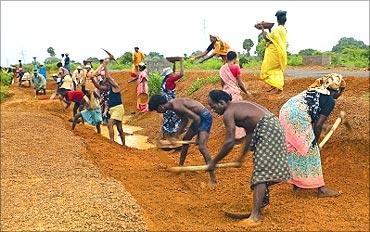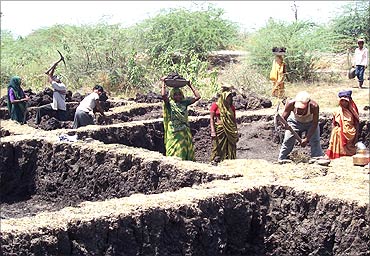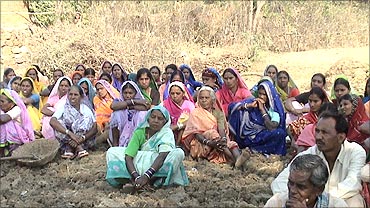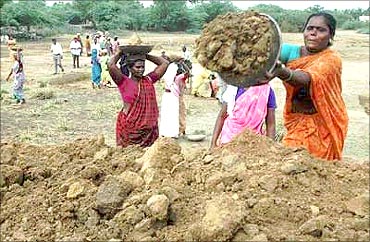Sreelatha Menon in New Delhi
The Mahatma Gandhi National Rural Employment Guarantee Scheme, the United Progressive Alliance government's flagship programme, has so far spent just 56 per cent of its Budget allocation of Rs 40,000 crore (Rs 400 billion).
It has also recorded a fall in the average number of workdays per household this financial year.
Government managers are asking for a 60 per cent rise in allocation for the scheme in the next financial year.
Rs 20,854 crore (Rs 208.54 billion) had been spent on the scheme until December 2010. Rs 64,000 crore (Rs 640 billion) has been sought for the coming financial year.
. . .
India's rural jobs scheme cuts spend, wants more cash
The ministry of rural development cites the higher wages that it has begun to pay since the start of this year as the reason for the hike.
The ministry had increased wages by 17-30 per cent from January 1, after indexing the earlier MGNREGS wage of Rs 100 to inflation.
However, with just 56 per cent of the funds spent until the end of December, the scheme and the ministry may be left with a huge surplus by the end of the next financial year.
In 2009-10, the ministry managed to spend only 76 per cent, while the spend was 72 per cent in 2008-09.
The problem is compounded by a sharp decline in the number of average workdays per household this financial year in comparison to the previous year, thus impacting spending.
. . .
India's rural jobs scheme cuts spend, wants more cash
States have spent as little as 4 per cent (Manipur, for example), with bigger states like Uttar Pradesh, Madhya Pradesh and Rajasthan spending around 40 per cent of funds.
Southern states Tamil Nadu and Andhra Pradesh have spent 92 per cent -- but, by year end.
The scheme entitles rural citizens to 100 days of work on demand. In this financial year, they have received an average of just 35 days up to the end of December.
West Bengal's rural households got an average of 20 days of work so far, while it was 30 in Uttar Pradesh, 27 in Uttarakhand, reaching up to 46 in Andhra Pradesh and 40 in Tamil Nadu and Rajasthan.
It was 46 days at the end of 2009, with states like Uttar Pradesh clocking 50 days. In December 2008, the average number of days was 53 for all states.
. . .
India's rural jobs scheme cuts spend, wants more cash
At the same time, states were left with a surplus funds last year.
While there was a surplus of Rs 7,000 crore (Rs 70 billion) last year, the surplus was double that amount in 2008-09, according to the ministry's own data.
The ministry has attributed this huge unspent balance to poor demand for work rather than to poor access to work.
Reetika Khera, an activist and a teacher at Delhi School of Economics who has co-authored studies on MGNREGS with economist and activist Jean Dreze, says that the fall in the number of workdays may be an indication of the growing difficulty in diverting money.
Since diversion is hard, enforcing agencies have lost interest and hence workdays are falling, she said.






article